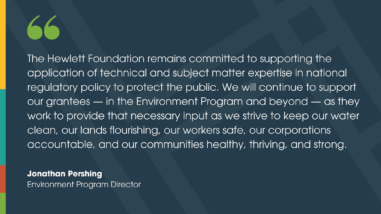Center for Strategic and International Studies
For The U.S. Plurilateral Climate Strategy
-
Amount$200,000
-
Program
-
Date Awarded11/22/2020
-
Term6.0 Months
-
Type of SupportGeneral Support/Program
Strategies
Overview
This grant supports the Center for Strategic and International Studies’ work to develop appropriate strategies on: debt-for-climate swaps; greening the Belt and Road Initiative (including through recommendations to other regional investors and donor countries); and working to better infuse climate issues into global trade. To date, foreign policy dimensions of climate have been under-emphasized as the environmental community focuses on domestic technical solutions, environmental advocacy, and the traditional sectors of energy and transport. This effort expands that scope, and seeks to enlarge the range of actors, particularly the community focused on international activities — including defense, diplomacy, and international trade, all of which will be central to meeting the demand for global deep decarbonization. (Substrategy: Multilateral)
About the Grantee
Grantee Website
www.csis.org
Address
1616 Rhode Island Ave, NW, Washington, DC, 20036, United States
Grants to this Grantee
for U.S. and China cooperation to advance global net-zero transition
The Center for Strategic and International Studies is dedicated to advancing practical ideas to address the world’s greatest challenges. This grant supports the center in identifying and supporting avenues for U.S.-China cooperation on transnational climate issues. Its focus will be to surface opportunities to address shared global challenges, including health care, food security, and climate mitigation and adaptation. (Substrategy: China National Policy)
for the U.S.-India Renewable Energy Event
The Center for Strategic and International Studies is a policy research organization dedicated to advancing practical ideas to address the world’s greatest challenges. This grant provides funding as it hosts an event to discuss India’s renewable energy goals and opportunities it, and the U.S., to work together in advancing climate action. This event will specifically focus on India’s renewable energy market. (Substrategy: India National Policy)
for the Energy Security and Climate Change Program
The Center for Strategic and International Studies is a policy research organization dedicated to advancing practical ideas to address the world’s greatest challenges. Achieving global energy transition requires reducing domestic emissions, while also incentivizing emissions reductions abroad. A clear vision for accomplishing this under different social and economic conditions is underdeveloped. This grant to the center’s Energy Security and Climate Change Program will support a cross-disciplinary research project to inform U.S. leadership in global decarbonization by increasing understanding of global trends and how U.S. public policy and trade strategies can influence international decarbonization. Working with a range of key stakeholders, including U.S. policymakers and diplomats, the private sector, academics, the press, and an advisory committee of leading academics and policy experts, this two-year effort will result in economic and policy studies, geopolitical research and analysis, conferencing, and educational products. (Substrategy: U.S. National Policy)



